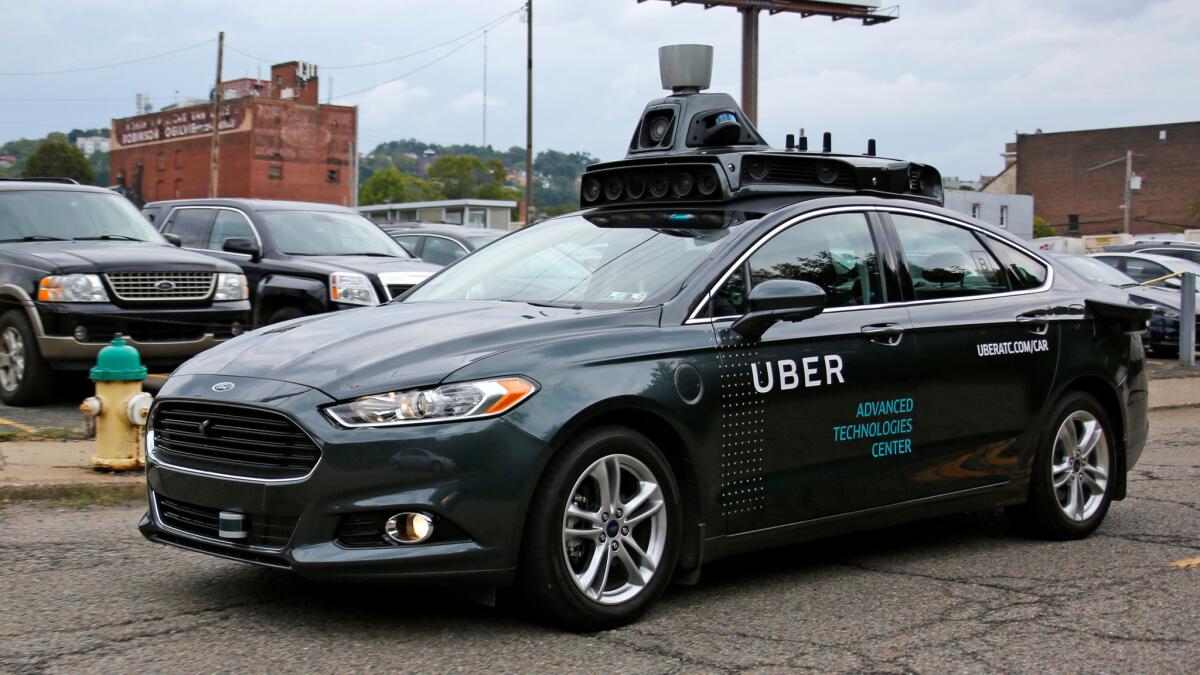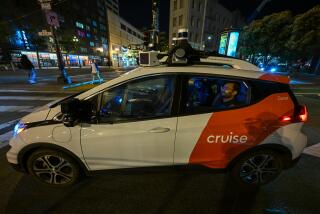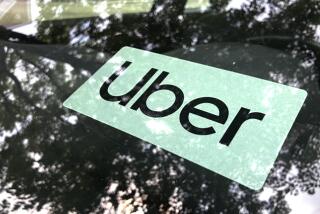Uber sells its self-driving vehicles arm

- Share via
Uber Technologies Inc. sold its self-driving-car division to Aurora Innovation Inc. and took a stake in the startup, creating a larger competitor to the leader in the field, Alphabet Inc.’s Waymo.
The deal will value Aurora at $10 billion, according to people familiar with the discussions who asked not to be identified discussing private information. In exchange for investing $400 million in Aurora, Uber will get a 26% ownership stake in the company. That number increases to 40% when counting the stakes held by the employees and investors of Uber’s autonomous driving division. Uber Chief Executive Officer Dara Khosrowshahi and one other yet-to-be-named person representing Uber will join Aurora’s board.
The deal, expected to close during the first quarter, also guarantees that when Aurora releases its self-driving vehicles, they’ll launch on Uber’s network.
By adding Uber’s self-driving-car unit, Aurora will gain hundreds of engineers and access to one of the world’s largest ride-hailing networks. For Uber, which has slashed high-profile cash-burning initiatives this year in a push to turn a profit in 2021, the deal will give it a significant stake in one of Silicon Valley’s most promising autonomous driving startups.
Uber’s driverless-car unit, Advanced Technologies Group, is a subsidiary, created just before Uber went public last year with its own $7.25-billion valuation. Still, the project’s long time frame and high costs concerned Uber’s investors SoftBank Group Corp., Benchmark and others, who for months have been privately urging Khosrowshahi to reconsider the autonomous driving strategy. During ATG’s short history, it has made progress building and testing autonomous driving systems, but also struggled amid a damaging lawsuit brought by Waymo, a tragic pedestrian fatality caused by one of its autonomous cars and the sector-wide reckoning that even the most basic self-driving vehicles will take significantly more time and money to develop than previously expected.
Announcing the news in a joint statement after the market closed Monday, Aurora and Uber said the group would focus on driverless trucking first and later more complicated light vehicles carrying passengers.
“It works well for both of us,” said Aurora CEO Chris Urmson in an interview Monday. “We’re excited to have them team with us, and we’re excited to have Dara join our board.”
Aurora’s co-founders have a deep history in the self-driving industry. Urmson previously led Google’s self-driving team, which became Waymo. Sterling Anderson directed Tesla Inc.’s autopilot efforts, Chief Technology Officer Drew Bagnell, an associate professor at Carnegie Mellon University, was part of the 2015 academic exodus that formed the Uber’s ATG team. Bagnell left ATG to co-found Aurora.
Aurora earlier this summer expanded testing on public roads from California and Pennsylvania to include Texas, with an initial focus on completing long-haul commercial trips instead of the more complicated urban maneuvers where there are more variables and opportunities for failure.
Having raised $765 million from investors including Index Ventures, Sequoia Capital, T. Rowe Price and Hyundai Motor Co., Aurora was valued at more than $3 billion last year, according to research firm PitchBook. Amazon.com Inc., which purchased its own self-driving startup, Zoox, earlier this year, is also an investor.
Aurora has roughly 600 employees, while Uber’s ATG group has about 1,200 employees, many of them based in Pittsburgh, long an epicenter of robotics thanks to Carnegie Mellon University.
Khosrowshahi had sold about 14% of ATG to partners SoftBank, Toyota Motor Corp. and Denso Corp. for $1 billion in 2019, but the unit was burning roughly $500 million a year and was set to exhaust funds by the end of next year, people familiar told Bloomberg this fall.
Even after combining forces, Aurora and ATG face stiff competition from more developed and better funded rivals. Waymo, which has logged millions of miles in more than two dozen cities, announced earlier this year it had raised $2.25 billion from auto manufacturers and private equity groups to expand to new locations.
TechCruch earlier reported that Aurora and Uber were discussing a deal.
More to Read
Inside the business of entertainment
The Wide Shot brings you news, analysis and insights on everything from streaming wars to production — and what it all means for the future.
You may occasionally receive promotional content from the Los Angeles Times.










